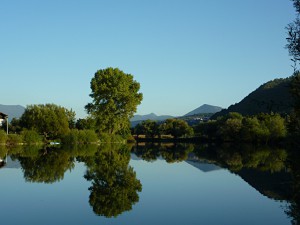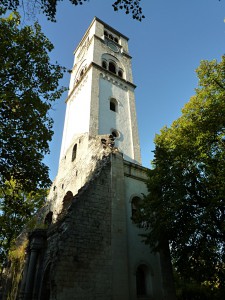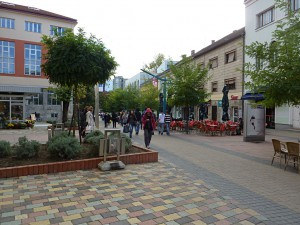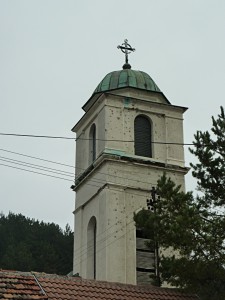After a very deep sleep in a private home near the Plitvice lakes, I made use of my host’s taxi services to get Bihac in Bosnia and Herzegovina. At the most central point in Bihac, in front of the Hotel Park, I was dropped off.My first steps on Bosnian soil followed.
May be one or the other already knows this, it was new for me: The dearestly missed currency in Germany, the Deutsche Mark, is still alive. Only incognito! The Mark seems to be a flexible currency, this is why it now appears under a different name: the Konvertible Mark (KM).
There are three major differences between the Konvertible Mark and the Deutsche Mark:
- It has a different Name
- It is being used in a different country
- The coins and notes look differently
But the exchange rate between the Euro and the Konvertible Mark is exactly the same as the one of the D-Mark used to be: 1.955.
That I had arrived in a new country, I realized quite quickly after crossing the border. Where I could find church after church in Zagreb, in Bosnia I saw minarets all over the place. And there are quite a few of them. Each village has at least one mosque with a minaret, often more. This fact naturally led to the question, what the differences between church towers and minarets are: regarded very dryly, both of them are tall parts of buildings which occasionally are the source of some kind of noise.
Another remarkable thing about the area around Bihac were the cars with Swiss license plates. A sign that many Bosnian people living in Switzerland actually come from that area. In Switzerland however, they live in all parts of the country, at least according to the license plates.
My first task in Bihac was to look for a place to stay. Simple task, knowing there are many private rooms available and just 2 months ago, a tourist information center opened next to the Hotel Park, where I was dropped off. The lady at the counter therefore was very helpful and explained everything about the city and the surroundings. My accommodation again was a private room with a family who had worked in Germany during the war in Bosnia. Thus it was quite interesting to listen to this fellows pronounced accent. He was also very helpful and friendly.
The city of Bihac does not offer much. A nice park at the river Una, a church, a mausoleum and a mosque. There is also a small shopping street with Cafés and Restaurants. More interesting is the area around the city, where there is a national park for hikes and the river Una for water activities, such as river-rafting. Due to my non-existent own transport, I stayed in the city and enjoyed the parks. Since I had to get up early the next morning for my long bus-ride to Sarajevo, I went shopping and to bed early.
To be safe, I hadn’t bought the bus ticket in advance, since the bus was already leaving at 7:30. With the food and the bottle of water I had bought the night before, I survived the bus ride of almost 7 hours. This was not evident, since the bus driver somehow only knew how to turn on the heating, but not how to turn it off or even turn on the air-conditioning. That’s why a few passengers almost melted away by the time we got Sarajevo.
In Sarajevo, I first enjoyed a breath of fresh air, before looking for a place to stay. Actually I had a place arranged via Couchsurfing, but somehow I am just not lucky with the hosts. So far it did not work out in one single place. Either I was too late asking for a couch or the person offering the couch had other things to do. Mostly people didn’t respond at all. The idea of couchsurfing really is a great one, having strange people staying in your apartment for a few nights. This gives the host the possibility to discover the people of the world by staying at home, and the travelers the possibility to discover more of the local culture. I will certainly continue trying to get an accommodation, since the Polish fellow who was on my bus today had real encouraging news from Warsaw: there the hosts apparently fight for the guests and not vice versa. Maybe I have to travel to Poland in the near future…
But for now, I am in Sarajevo, where I will discover the host city of the 1984 winter olympics.




